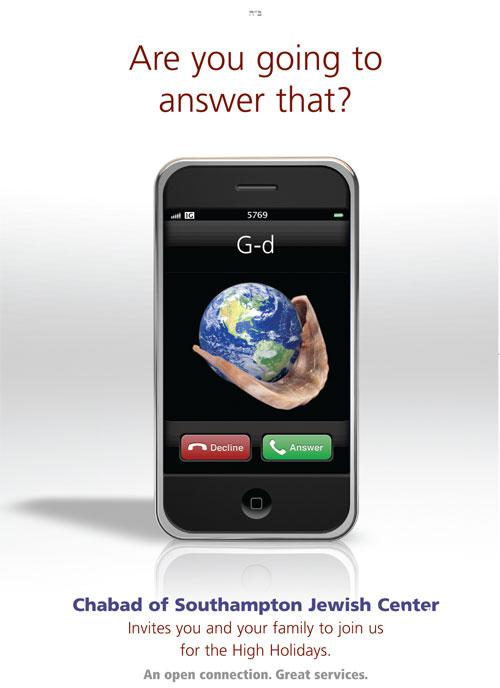(lubavitch.com) Wall Street bailouts, iPhones, and stratospheric gas prices are bringing more marginally affiliated Jews to Rosh Hashanah services say rabbis across the United States.
Tough times draw larger crowds to the synagogue on the High Holidays, and Chabad representatives are aiming to attract even more by answering the call of the times and publicizing their prayer services using images ripped straight from the headlines and pop culture.
Signs of the times are also apparent in the messages rabbis will be delivering during the holidays. Known as the Days of Awe, the Jewish High Holidays are a time for supplication and somber reflection—and maybe intimidating to the Jewish people who rarely attend synagogue services. Reaching out to them Chabad rabbis are sharing the Chasidic interpretation of the High Holy days, emphasizing themes of forgiveness and acceptance.
When the government announced its almost trillion dollar injection to failing finance firms, Chabad-Lubavitch of Greater Boynton, Florida, got the message loud and clear. It wasn’t only the fat cats who’d be suffering this fall.
"Although we certainly are not a recipient of this funding, we are hearing daily the mounting economic tribulations of each of our members,” said Rabbi Sholom Ciment the center’s director.
With economic news worsening, Chabad in Boynton implemented a “No Pay to Pray” program, where congregants can reserve High Holiday seats without a fee.
“There is always room for another Jew at Chabad, and we are re-making our floor plan to accommodate any Jew who finds their High Holiday attendance impeded by the economic crisis," said Howard Cohen, chairman of Chabad's High Holiday committee.
A clever youtube video by Rabbi Moshe Kievman of North Miami Beach depicts a desperate Jew buying tickets from a scalper to get into shul on Rosh Hashana. "You should have joined services at the unshul," is the message to people thinking they've got to scrape a small fortune together to pray on Rosh Hashana.
On the flip side are those riding high despite the turmoil. In the tony beach community of Southampton, NY, whose numbers bloom with high-powered Manhattanites each summer, Chabad has used this season’s hot accessory – an iPhone – to bring in new faces at holiday services.
In Southampton Jewish Center’s brochure, an iPhone displays a call from “G-d” coming through with the option to “answer” or “decline” showing on the screen. Rabbi Rafe Konikov asked the New York graphics and marketing firm Spotlight Design to come up with a design that was relevant to the community.
“Everyone around here – from eighty to eight year olds – walks around with an iPhone, a cell phone or a Blackberry. Choosing this design was a no brainer. People like innovative approaches that speak their language,” said Rabbi Konikov. The synagogue’s tent will be used to accommodate the 400 people attending the center throughout the High Holiday season.
Rabbi Yossel Kranz, director of Chabad of the Virginias brainstormed independently. On an image of a gas station’s pricing sign set against a clear blue sky, Chabad of the Virginias asks: “Do you feel like you are running on empty?…It’s time to fill ‘er up. It’s time to go to Shul and nourish our souls.”
Rabbi Kranz anticipates about 300 in his shul for Rosh Hashana. He intends to greet them with an optimistic message. Interpreting the Days of Awe with fire and brimstone, judgment and punishment, falls short of the majesty of the day, the rabbi said.
“Rosh Hashanah celebrates the birthday of humankind. “It is a reaffirmation of life and its message must be transmitted with love and joy. Anything to the contrary completely misses the boat.”
People do not need to intimidated to be touched by the holidays. They need “the spirit and the positive energy of Rosh Hashanah more than anything else. They do not need to be scared. Life is scary enough.”
This perspective on Rosh Hashanah is one Rabbi Kranz learned by attending services at Chabad Lubavitch Headquarters in Brooklyn, NY, as a child. He watched and listened to the Lubavitcher Rebbe, Rabbi Menachem M. Schneerson, of righteous memory, whose “focus was always the positive—all of the good that is there. My memories of Rosh Hashanah are all incredibly exciting. They are memories of energy and passion.”
A fellow Brooklynite Rabbi Moshe Bryski grew up on the same experiences, which guides his leadership of Chabad of the Conejo Valley, CA. This Rosh Hashanah, when 1800 people will be joining his Chabad center for a High Holiday retreat at the Hyatt Hotel, Rabbi Bryski will be concentrates on the warmer messages of the day.
He cites the prayer that describes G-d as a Father and King as a central holiday thought because it delivers a clear message: “Everyone has the relationship with G-d.”
Rabbi Bryski views Rosh Hashanah as an opportunity to address the gloom that has seeped from the headlines into the mortgages and sleepless nights of the average American.
“The focus of the prayer is not to stress that today life and death is going to be sealed. Instead you have the power on Rosh Hashanah and Yom Kippur to work with the cards you’ve been dealt and change that destiny for the better.”

Be the first to write a comment.